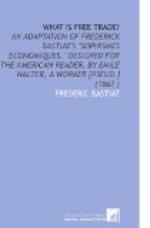OBSTRUCTED RIVERS PLEAD FOR THE PROHIBITIONISTS.
Some years ago, when the Spanish Cortes were discussing a treaty with Portugal on improving the course of the river Douro, a deputy rose and said, “If the Douro is turned into a canal, transportation will be made at a much lower price. Portuguese cereals will sell cheaper in Castile, and will make a formidable opposition to our national labor. I oppose the project unless the ministers engage to raise the tariff in such a way as to restore the equilibrium.” The assembly found the argument unanswerable.
Three months later the same question was submitted to the Senate of Portugal. A noble hidalgo said: “Mr. President, the project is absurd. You post guards, at great expense, on the banks of the Douro, in order to prevent the introduction of Castilian cereals into Portugal, while, at the same time, you would, also, at great expense, facilitate their introduction. This is an inconsistency with which I cannot identify myself. Let the Douro pass on to our sons as our fathers left it to us.”
Now, when it is proposed to alter and confine the course of the Mississippi, we recall the arguments of the Iberian orators, and say to ourselves, if the member from St. Louis was as good an economist as those of Valencia, and the representatives from New Orleans as powerful logicians as those of Oporto, assuredly the Mississippi would be left
“To sleep amid its forests dank and lone,”
for to improve the navigation of the Mississippi will favor the introduction of New Orleans products to the injury of St. Louis, and an inundation of the products of St. Louis to the detriment of New Orleans.
CHAPTER XVII.
A NEGATIVE RAILROAD.
We have said that when, unfortunately, we place ourselves at the point of view of the producer’s interest, we cannot fail to clash with the general interest, because the producer, as such, demands only efforts, wants, and obstacles.
When the Atlantic and Great Western Railway is finished, the question will arise, “Should connection be broken at Pittsburg?” This the Pittsburgers will answer affirmatively, for a multitude of reasons, but for this among others; the railroad from New York to St. Louis ought to have an interruption at Pittsburg, in order that merchandise and travellers compelled to stop in the city may leave in it fees to the hackmen, pedlars, errand-boys, consignees, hotel-keepers, etc.
It is clear, that here again the interest of the agent of labor is placed before the interest of the consumer.
But if Pittsburg ought to profit by the interruption, and if the profit is conformable with public interest, Harrisburg, Dayton, Indianapolis, Columbus, much more all the intermediate points, ought to demand stoppages, and that in the general interest, in the widely extended interest of national labor, for the more they are multiplied, the more will consignments, commissions, transportations, be multiplied on all points of the line. With this system we arrive at a railroad of successive stoppages, to a negative railroad.




